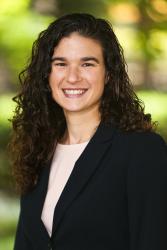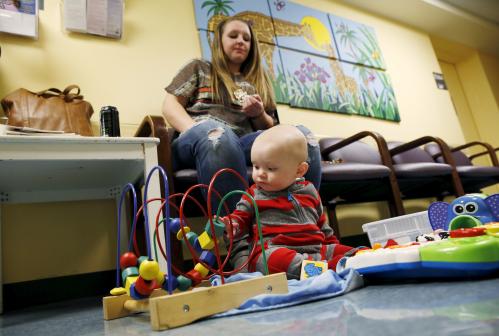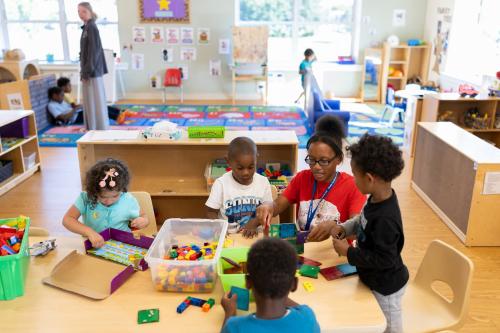Two decades ago, researchers Betty Hart and Todd Risley revealed a particularly stark difference in the experiences of toddlers with different income levels. As Hart and Risley described it, low-income infants hear many fewer words per day than their middle- and high-income peers, totaling to a 30-million-word difference by age three. They coined this discrepancy “the word gap.” Hart and Risley also found that students who had heard fewer words as toddlers correlated with worse performance on tests of vocabulary and language development years later.
More recent studies have similarly identified a word gap, albeit not to the tune of 30 million words, and shown that spoken word counts predicted vocabulary and language understanding months later even when controlling for previous vocabulary levels and maternal education. A separate study showed that, by age two, toddlers from lower socio-economic backgrounds can be six months behind their wealthier peers in vocabulary. Despite widespread acknowledgement of the scale of the problem, including a push from former President Barack Obama on the issue, progress toward closing the word gap has been slow.
Providence Talks implementation and results
A number of cities have begun addressing this problem with innovative programs. In the 2013 Mayors Challenge, Bloomberg Philanthropies awarded the grand prize and a $5 million grant to the city of Providence, R.I., for an innovative plan to reduce this word gap. In May, four years after the competition, Bloomberg released preliminary results of the program.
Though a small city with fewer than 200,000 residents, Providence faces challenges that are common across larger urban areas. In 2013, when the city won the Mayors Challenge, 85 percent of Providence Public School District students were eligible for free or reduced-price lunch, and only 66 percent of students graduated high school in four years. Barely 30 percent of students entering kindergarten demonstrated benchmark early literacy skills. To the extent that Providence is successful in minimizing the word gap, its efforts could be informative for cities across the United States.
Providence’s program–titled Providence Talks–relied on a recording device called a “word pedometer” to monitor and improve spoken word counts in low-income homes. The program originally paired families with in-home coaches to analyze the data from the pedometer, and as the program scaled up to its peak of more than 1,300 toddlers, Providence Talks adopted other structures as well. For example, the family playgroup model facilitated conversations between parents about child development and strategies to increase engagement with children, while the leader analyzed each family’s recordings with the adults before or afterwards. Every visit, in the home or to a playgroup, included a free book for families to keep.
The word pedometer tracked both words spoken and conversational turns–the number of times the conversation changes from an adult to a child and back again, roughly a measure of the give and take in a conversation. The device, designed by Colorado-based LENA, was placed in a small pocket in a special toddler vest and could record words spoken in Spanish and English. It recorded all words in a child’s environment and can separate words spoken by an adult from television or other noises.
Bloomberg Philanthropies reported this May that 60 percent of children in Providence Talks heard more words at the end of the program than at the beginning. On average, the number of words toddlers heard in a day increased by 50 percent. Families who started at the lowest end of the spectrum, whose children heard fewer than 8,000 words a day at the outset—barely more than half of the 15,000 words needed for healthy brain development–recorded strong gains of 45 percent in words recorded. Ninety-seven percent of parents reported being satisfied or highly satisfied with the program.
Providence Talks has partnered with Brown University researchers to examine the effects of the increase in spoken words on the toddlers’ language skills. In a city with 40 percent child poverty, eight percentage points higher than the national average, these changes and the program that produced them could have the potential to shrink developmental gaps long-term.
Data limitations
Notably, the word pedometer used by Providence Talks does not measure the complexity of the words spoken nor their tone. “The soup is very hot” counts the same as “the computer mouse is broken,” even though the second sentence includes more difficult vocabulary. However, recent research indicates that quality may matter more than the quantity itself. Similarly, “Do not touch that!” counts the same as “I’m proud of you,” although research that indicates affirmations build confidence and skills better than prohibitions.
While Providence Talks coaches work individually with families to build quality and affirmations into daily word counts, the word pedometer does not track this progress, and researchers are unable to listen to the audio themselves. The Rhode Island branch of the American Civil Liberties Union, concerned with privacy issues at the outset of the program, convinced Providence Talks to implement automatic deletion of the files after analysis by a computer.
Moving forward
Despite these limitations, the initial success of Providence Talks suggests a potential strategy for closing the word gap. Some organizations and cities have already begun to replicate this work, including the Talking is Teaching initiative by the Clinton Foundation and The Opportunity Institute, to raise awareness of the word gap and conversational strategies to boost word use with children. A Georgia program called Talk with Me Baby premiered in 2013 to discuss the importance of talking to children with their parents. In Hartford, Conn., a community agency has started a program called Words Count to improve language skills of children under 5 years old through weekly home visits and word pedometers, an initiative similar to the Providence program. The Thirty Million Words Initiative at the University of Chicago plans a community-based rollout of their language-focused curriculum this year.
Measures of school readiness–such as the ability to recognize all the letters, write one’s name, and count to 20–have reflected substantial differences between low-income students and their wealthier peers for decades. The aforementioned research has shown that these differences originate early and persist, making the word gap a promising target for intervention. Building on the success of Providence Talks, other cities could similarly target the word gap to leverage the power of the home in early childhood education.
Sarah Novicoff contributed to this post. | Update 7/17/17: This post has been updated to clarify information about the LENA device used during Providence Talks. It does not have a playback button; additionally, the device recorded all words in a child’s environment and is able to separate words spoken by an adult from television or other noises.
The Brookings Institution is committed to quality, independence, and impact.
We are supported by a diverse array of funders. In line with our values and policies, each Brookings publication represents the sole views of its author(s).







